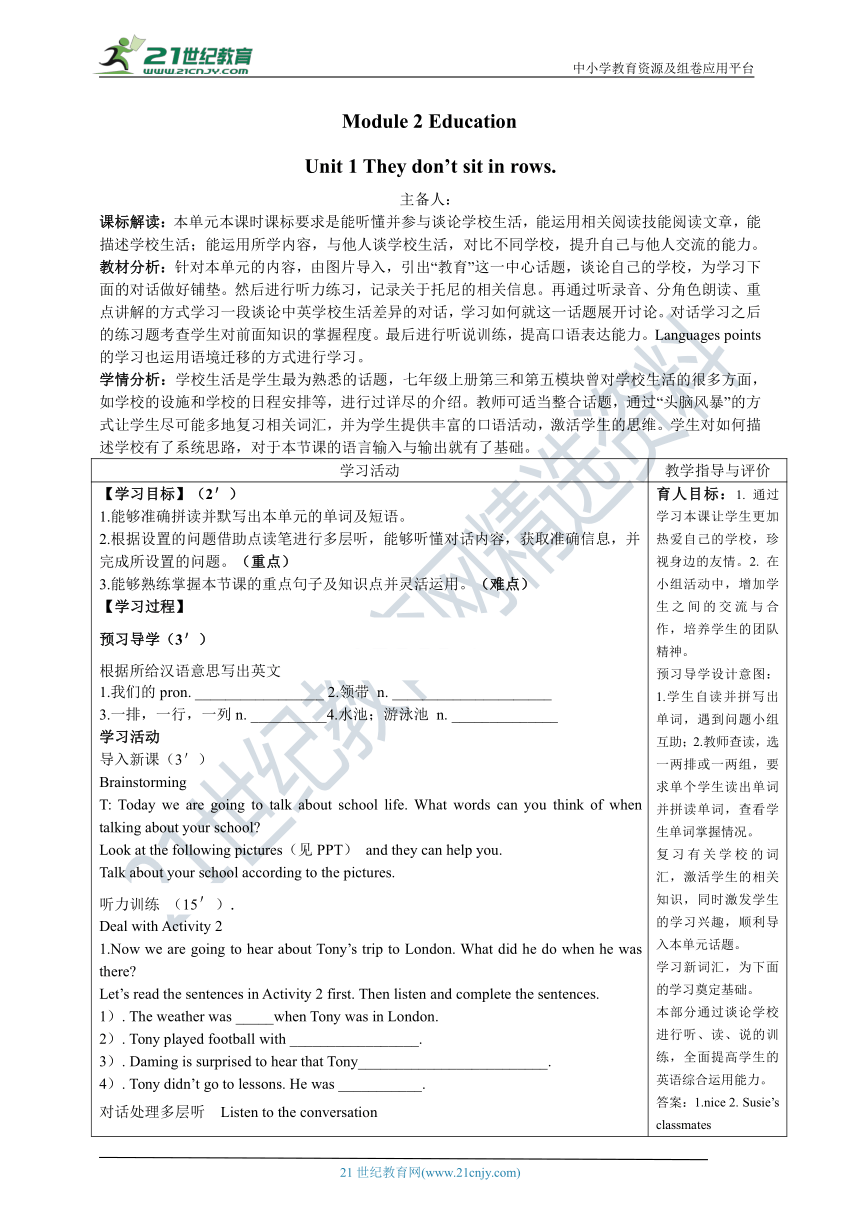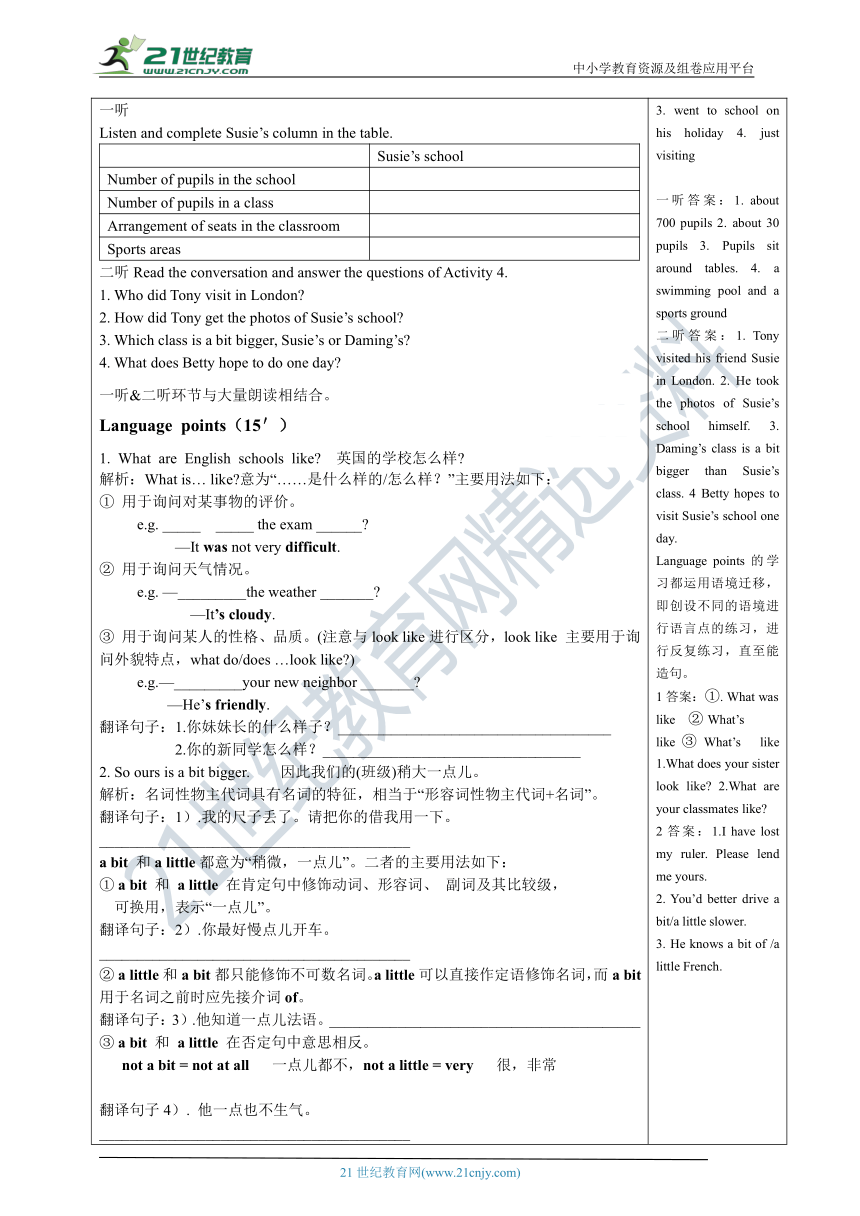Module 2 Education Unit 1 They don’t sit in rows.导学案
文档属性
| 名称 | Module 2 Education Unit 1 They don’t sit in rows.导学案 |

|
|
| 格式 | zip | ||
| 文件大小 | 1.2MB | ||
| 资源类型 | 试卷 | ||
| 版本资源 | 外研版 | ||
| 科目 | 英语 | ||
| 更新时间 | 2020-02-16 00:00:00 | ||
图片预览


文档简介
中小学教育资源及组卷应用平台
Module 2 Education
Unit 1 They don’t sit in rows.
主备人:
课标解读:本单元本课时课标要求是能听懂并参与谈论学校生活,能运用相关阅读技能阅读文章,能描述学校生活;能运用所学内容,与他人谈学校生活,对比不同学校,提升自己与他人交流的能力。
教材分析:针对本单元的内容,由图片导入,引出“教育”这一中心话题,谈论自己的学校,为学习下面的对话做好铺垫。然后进行听力练习,记录关于托尼的相关信息。再通过听录音、分角色朗读、重点讲解的方式学习一段谈论中英学校生活差异的对话,学习如何就这一话题展开讨论。对话学习之后的练习题考查学生对前面知识的掌握程度。最后进行听说训练,提高口语表达能力。Languages points 的学习也运用语境迁移的方式进行学习。
学情分析:学校生活是学生最为熟悉的话题,七年级上册第三和第五模块曾对学校生活的很多方面,如学校的设施和学校的日程安排等,进行过详尽的介绍。教师可适当整合话题,通过“头脑风暴”的方式让学生尽可能多地复习相关词汇,并为学生提供丰富的口语活动,激活学生的思维。学生对如何描述学校有了系统思路,对于本节课的语言输入与输出就有了基础。
学习活动 教学指导与评价
【学习目标】(2')1.能够准确拼读并默写出本单元的单词及短语。 2.根据设置的问题借助点读笔进行多层听,能够听懂对话内容,获取准确信息,并完成所设置的问题。(重点) 3.能够熟练掌握本节课的重点句子及知识点并灵活运用。(难点)【学习过程】 预习导学(3')根据所给汉语意思写出英文1.我们的pron. _________________ 2.领带 n. _____________________ 3.一排,一行,一列n. __________4.水池;游泳池 n. ______________学习活动导入新课(3')Brainstorming T: Today we are going to talk about school life. What words can you think of when talking about your school? Look at the following pictures(见PPT) and they can help you.Talk about your school according to the pictures.听力训练 (15').Deal with Activity 2 1.Now we are going to hear about Tony’s trip to London. What did he do when he was there? Let’s read the sentences in Activity 2 first. Then listen and complete the sentences. 1). The weather was _____when Tony was in London.2). Tony played football with _________________. 3). Daming is surprised to hear that Tony_________________________. 4). Tony didn’t go to lessons. He was ___________.对话处理多层听 Listen to the conversation 一听 Listen and complete Susie’s column in the table. Susie’s school Number of pupils in the school Number of pupils in a class Arrangement of seats in the classroom Sports areas 二听Read the conversation and answer the questions of Activity 4.1. Who did Tony visit in London?2. How did Tony get the photos of Susie’s school?3. Which class is a bit bigger, Susie’s or Daming’s?4. What does Betty hope to do one day? 一听&二听环节与大量朗读相结合。Language points(15')1. What are English schools like? 英国的学校怎么样?解析:What is… like?意为“……是什么样的/怎么样?”主要用法如下:① 用于询问对某事物的评价。 e.g. _____ _____ the exam ______? —It was not very difficult.② 用于询问天气情况。 e.g. —_________the weather _______? —It’s cloudy. ③ 用于询问某人的性格、品质。(注意与look like进行区分,look like 主要用于询问外貌特点,what do/does …look like?) e.g.—_________your new neighbor _______?
—He’s friendly.翻译句子:1.你妹妹长的什么样子?____________________________________ 2.你的新同学怎么样?__________________________________ 2. So ours is a bit bigger. 因此我们的(班级)稍大一点儿。 解析:名词性物主代词具有名词的特征,相当于“形容词性物主代词+名词”。翻译句子:1).我的尺子丢了。请把你的借我用一下。 _________________________________________a bit 和a little都意为“稍微,一点儿”。二者的主要用法如下:① a bit 和 a little 在肯定句中修饰动词、形容词、 副词及其比较级, 可换用,表示“一点儿”。翻译句子:2).你最好慢点儿开车。 _________________________________________② a little和a bit都只能修饰不可数名词。a little可以直接作定语修饰名词,而a bit用于名词之前时应先接介词?of。翻译句子:3).他知道一点儿法语。_________________________________________③ a bit 和 a little 在否定句中意思相反。 not a bit = not at all 一点儿都不,not a little = very 很,非常 翻译句子4). 他一点也不生气。 _________________________________________翻译句子5). 他非常生气。 _________________________________________ 3. I hope I can visit Susie’s school one day. 希望我有一天可以去苏西的学校。解析:one day意为“某一天,有一天”,既可用于过去时中,也可用于将来时中。some?day(或someday)也有“某一天”之意,但它指的是“将来的某一天”,用在将来时中。 1)总有一天我俩都有机会看看纽约。________________________________________ 2)有一天他上学迟到了。 ________________________________________ 3)有朝一日,我会成为一名飞行员。 ________________________________________4. I took them myself. ??我自己拍的。这里的反身代词myself 在句中作同位语,起加强语气的作用。反身代词在句中还可以作宾语。翻译句子: 1)你最好去问问你老师本人。 _________________________________________ 2)我们应该照顾好自己。 ?_________________________________________跟读、自读、小组分角色朗读,在朗读过程中注意语音、语调、纠音。背诵对话中的重点句子,并进行小组展示。Summary:当堂检测(7')A) 点读笔点读下列句子两遍,学生分别复述句子。1.What are English schools like?2.How many pupils are there in a class in England?3.They don’t sit in rows.B)用所给词的适当形式填空1. Their classroom is bigger than_______ (we).2. Children enjoyed_____(they) yesterday on the playground.3. A_______ (swim) pool is somewhere you can swim.C)翻译句子。 1. 南希的那本书虽然有趣,但我这本更有趣。 _________________________________________________________________ 2. 没有人教他画画。他是自学的。 _________________________________________________________________自我反思 育人目标:1. 通过学习本课让学生更加热爱自己的学校,珍视身边的友情。2. 在小组活动中,增加学生之间的交流与合作,培养学生的团队精神。预习导学设计意图:1.学生自读并拼写出单词,遇到问题小组互助;2.教师查读,选一两排或一两组,要求单个学生读出单词并拼读单词,查看学生单词掌握情况。复习有关学校的词汇,激活学生的相关知识,同时激发学生的学习兴趣,顺利导入本单元话题。学习新词汇,为下面的学习奠定基础。 本部分通过谈论学校进行听、读、说的训练,全面提高学生的英语综合运用能力。答案:1.nice 2. Susie’s classmates 3. went to school on his holiday 4. just visiting 一听答案:1. about 700 pupils 2. about 30 pupils 3. Pupils sit around tables. 4. a swimming pool and a sports ground二听答案:1. Tony visited his friend Susie in London. 2. He took the photos of Susie’s school himself. 3. Daming’s class is a bit bigger than Susie’s class. 4 Betty hopes to visit Susie’s school one day. Language points的学习都运用语境迁移,即创设不同的语境进行语言点的练习,进行反复练习,直至能造句。1答案:①. What was like ② What’s like ③ What’s like 1.What does your sister look like? 2.What are your classmates like?2答案:1.I have lost my ruler. Please lend me yours. 2. You’d better drive a bit/a little slower. 3. He knows a bit of /a little French. 4. He’s not a bit angry. = He’s not angry at all. 5. He’s not a little angry. = He’s very angry. 3答案:1)One day we’ll both get a chance to see New York. 2)One day he was late for school. 3) Some day / One day, I’ll be a pilot. 4答案:1. You’d better ask your teacher himself. (作同位语) 2. We should take care of ourselves. (作介词的宾语) 学生总结,必要时老师指导。 答案:B)1.ours 2.themselves3.swimming C)1. Nancy’s book is interesting, but mine is more interesting. 2. Nobody taught him drawing. He learned it himself.
九年级 英语学科作业纸
编制人: 使用时间:
作业内容 作业指导与评价
一、必做题:《同行学案》P026Ⅴ短文填空二、选做题《同行学案》P016Ⅲ翻译句子三、听本单元单词、课文听力,并且注意模仿语音语调。
21世纪教育网 www.21cnjy.com 精品试卷·第 2 页 (共 2 页)
HYPERLINK "http://21世纪教育网(www.21cnjy.com)
" 21世纪教育网(www.21cnjy.com)
同课章节目录
- Module 1 Travel
- Unit 1 We toured the city by bus and by taxi
- Unit 2 It's a long story.
- Unit 3 Language in use
- Module 2 Education
- Unit 1 They don't sit in rows.
- Unit 2 What do I like best about school?
- Unit 3 Language in use
- Module 3 Life now and then
- Unit 1 They sometimes work harder.
- Unit 2 I think life is better today.
- Unit 3 Language in use.
- Module 4 Rules and suggestions
- Unit 1 You must be careful of falling stones.
- Unit 2 we must keep the camp clean.
- Unit 3 Language in use.
- Revison A
- Module 5 Look after yourself
- Unit 1 We'd better get you to hospital.
- Unit 2 Get off the sofa!
- Unit 3 Language in use.
- Module 6 Eating togethe
- Unit 1 When is the school-leavers' party?
- Unit 2 Knives and forks are used for most Western
- Unit 3 Language in use
- Module 7 English for you and me
- Unit 1 Have you ever been to an English corner?
- Unit 2 We all own English.
- Unit 3 Language in use
- Module 8 My future life
- Unit 1 Here's to our friendship and the future
- Unit 2 I know that you will be better at maths.
- Unit 3 Language in use
- Revison B
